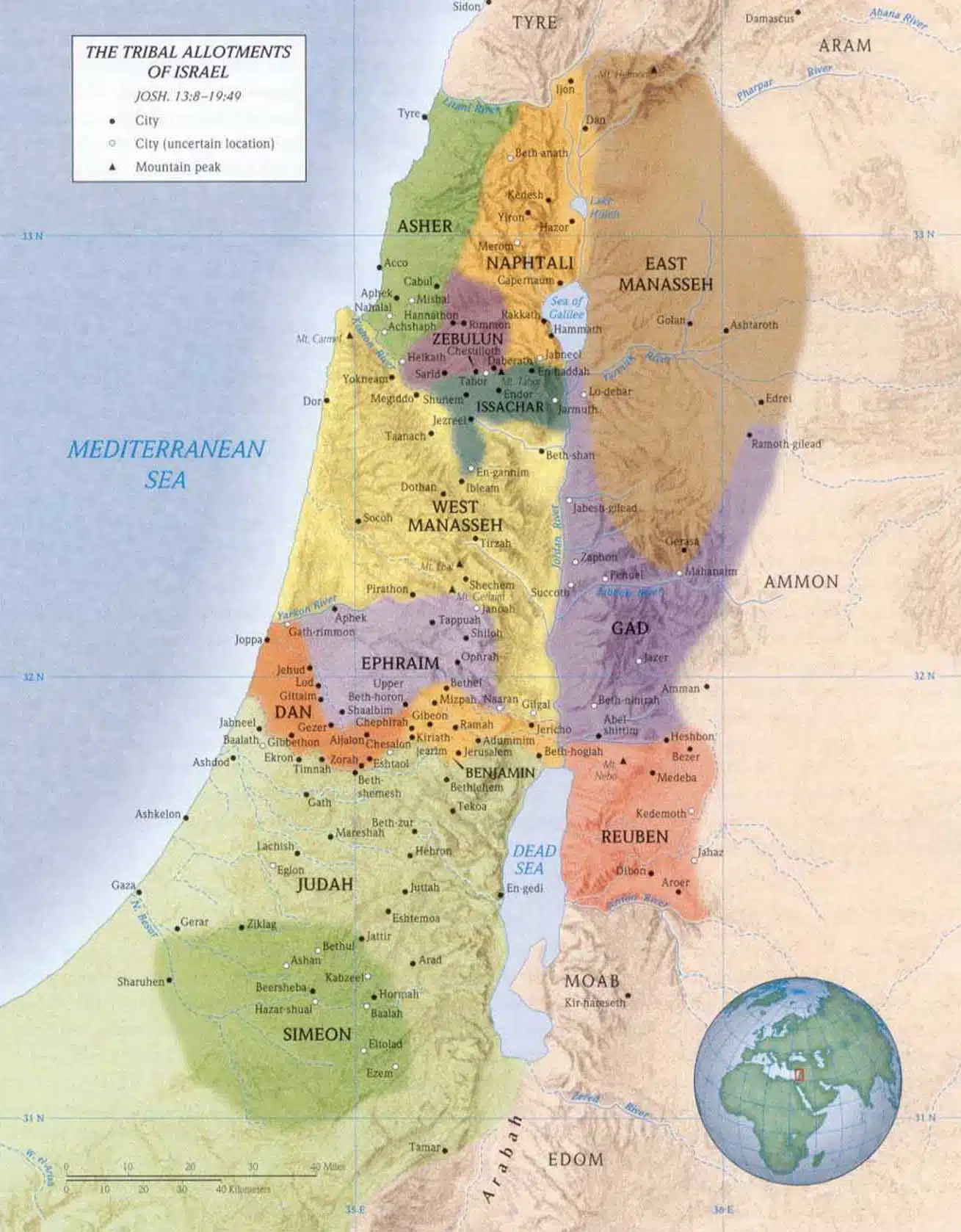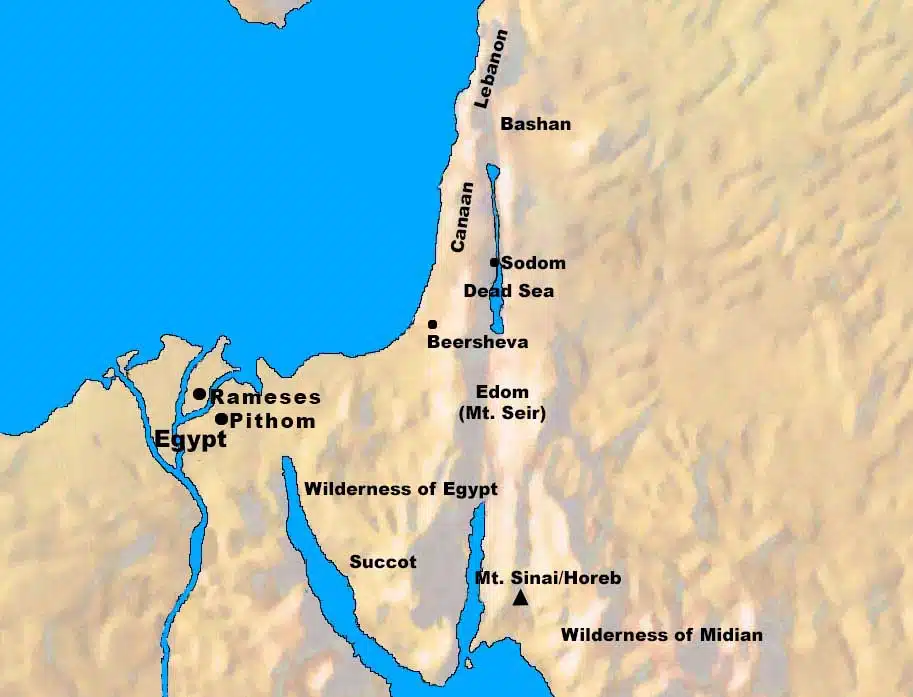A genealogy is given.
Verses 14 – 25 seem out of place. In the midst of the LORD reassuring and re-commissioning Moses for the task at hand, this genealogy initially seems to out of place. A closer look, however, reveals an apparent point of validating Moses’ and Aaron’s link to the priestly line through Levi. This would link the command of verse 13 for Moses and Aaron to intercede for Israel before Pharaoh to their connection with the lineage of priests, whose job was to intercede before God for Israel.
In verse 14, These are the heads of their fathers’ households begins another section which ends in verse 25. The phrase “fathers’ households” is literally “the house of their fathers,” and it refers to a family descended from a single ancestor. In other words, it frequently indicates an extended family within a tribe, or a clan that is a sub-division of a tribe.
This genealogy is primarily concerned with six generations of the tribe of Levi. It starts in verse 14 with mentioning four sons of Reuben, the first-born of Jacob by his first wife Leah (Genesis 29:32). Then in verse 15 it lists the sons of Simeon, Leah’s second son . It does not mention any of the other sons of Jacob except Levi, the third son of Leah.
The first two sons of Jacob having been described, the rest of the section concerns the third son of Jacob – Levi. It lists the sons of Levi (Gershon, Kohath, and Marari) and their descendants. Among the descendants of Kohath were Aaron and Moses. It is interesting that this genealogy does not list the sons of Moses, but it does mention the sons of Aaron. It also includes one grandson of Aaron, Phinehas, the son of Eleazar, son of Aaron.
Aaron was assigned a priestly function to speak for Moses before Pharaoh when Moses objected to God using him due to his halting speech. This further supports the notion that the focus here is upon the priestly lineage. Perhaps the idea is that the LORD, the I Am, Creator and Sustainer of all that is, established Moses and Aaron to provide a bridge to relate to Him, and that bridge continues on through their lineage. This story of deliverance is not just history. This story establishes a continuing covenant relationship.
The point of the genealogy seems to be to validate Moses’ and Aaron’s link to the priestly line, and to establish Aaron as the line for the priests (which we will see appointed in chapter 28). Also, they were the ones chosen by the LORD to receive His revelation and be His spokesmen to His people and to Pharaoh. The confrontation between Moses and Pharaoh was about to begin, and Moses and Aaron would have numerous messages from the LORD to Pharaoh.
Biblical Text
14 These are the heads of their fathers’ households. The sons of Reuben, Israel’s firstborn: Hanoch and Pallu, Hezron and Carmi; these are the families of Reuben. 15 The sons of Simeon: Jemuel and Jamin and Ohad and Jachin and Zohar and Shaul the son of a Canaanite woman; these are the families of Simeon. 16 These are the names of the sons of Levi according to their generations: Gershon and Kohath and Merari; and the length of Levi’s life was one hundred and thirty-seven years. 17 The sons of Gershon: Libni and Shimei, according to their families. 18 The sons of Kohath: Amram and Izhar and Hebron and Uzziel; and the length of Kohath’s life was one hundred and thirty-three years. 19 The sons of Merari: Mahli and Mushi. These are the families of the Levites according to their generations. 20 Amram married his father’s sister Jochebed, and she bore him Aaron and Moses; and the length of Amram’s life was one hundred and thirty-seven years. 21 The sons of Izhar: Korah and Nepheg and Zichri. 22 The sons of Uzziel: Mishael and Elzaphan and Sithri. 23 Aaron married Elisheba, the daughter of Amminadab, the sister of Nahshon, and she bore him Nadab and Abihu, Eleazar and Ithamar. 24 The sons of Korah: Assir and Elkanah and Abiasaph; these are the families of the Korahites. 25 Aaron’s son Eleazar married one of the daughters of Putiel, and she bore him Phinehas. These are the heads of the fathers’ households of the Levites according to their families.
Check out our other commentaries:
-
Proverbs 31:23-26 meaning
The virtue of the excellent wife impacts her husband. She is clothed in honor and speaks with the wisdom central to the overall message of...... -
Acts 5:7-11 meaning
Sapphira, the wife of Ananias, goes before the apostles, not knowing that her husband is dead. Peter tests her by asking if the money they...... -
Philemon 1:15-16 meaning
Paul requests that Philemon emancipate Onesimus and receive him as a beloved brother....... -
Exodus 7:14-25 meaning
Since the account of the plagues upon Egypt begins here in verse 14 and extends to 12:32, it is useful to include a word of...... -
Exodus 31:12-17 meaning
The LORD gives a strong reminder that, in spite of their spiritual duty to build the tabernacle and the furnishings, the craftsmen are required to......




